Blog Post
Posted by Dion Todd February 4th, 2018 9,905 Views 0 Comments
Bible Study, Luke Chapter Twenty-One from Refreshing Hope Ministries on Vimeo.
Today we are going to continue our Bible study and we will be studying Luke Chapter 21 in depth. You can follow along in your own Bible if you like. I will be reading from the World English Bible because it is copyright free.
After you finish this study, please take the accompanying quiz to test your knowledge. Thanks to everyone that has participated so far. Let’s get started:
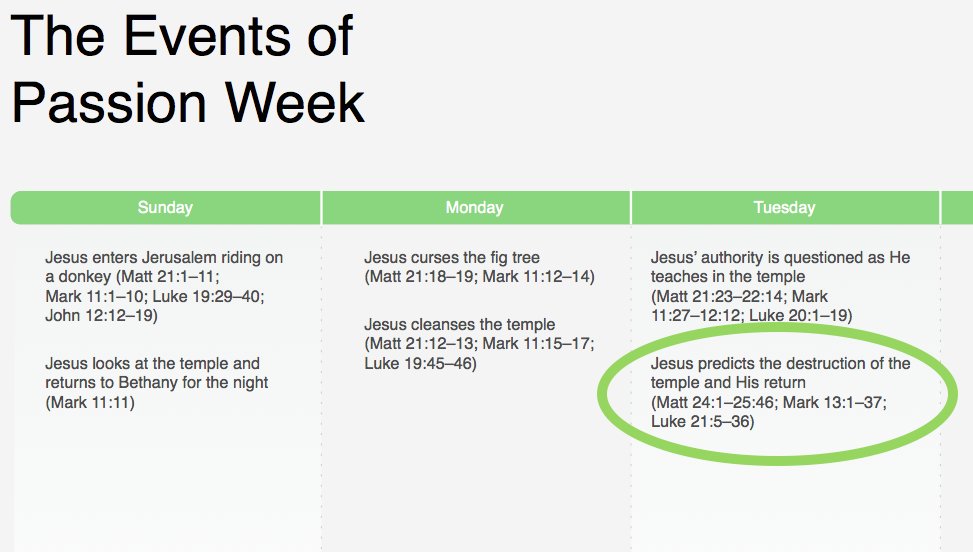
The closest month to this time frame would be March or April, because Passover is a spring festival. The passover feast in the year 2018 will be from March 30 through April 7. Also the Jewish days are not named after gods and moons like Thor’s day and Saturn’s day, but this at least gives us an idea of when this took place. It was in early spring, and if Jesus did enter Jerusalem on the sun’s day, then this chapter would be happening on Tuesday, which happens to be named after another norse god. Our society reeks of paganism, so much that it is hard to make exact dates for biblical events.
After Jesus arrived, the following day, He drove the money changers out of the temple there and He began teaching in the courtyards of Herod’s renovated temple. The religious leaders harassed Him with questions trying to trap Him in something that He said, but Jesus was so far ahead of them intellectually that they never posed a challenge. Jesus taught in the temple during the day, and spent the night on the Mount of Olives (21:37), probably in the village of Bethany (Mark 11:11). Now Jesus is sitting in the temple treasury watching the people give their offerings. That is where this chapter begins.
Luke Chapter 21 beginning in verse 1 reading from the World English Bible: He looked up and saw the rich people who were putting their gifts into the treasury. 2 He saw a certain poor widow casting in two small brass coins.
The renovated temple of Herod had many areas and was about the size of 4 football fields. It was a giant impressive structure that had been under construction for over 46 years. Outside the temple was the Court of the Gentiles, where Jesus had driven out the money changers.
The money changers were people who would sell you a sheep or a dove to offer if you did not bring one to the temple. It started out as an service to the people but later became corrupt with them buying low and selling high, for maximum profit. They had become thieves, which is why Jesus drove them and their livestock out of the temple.
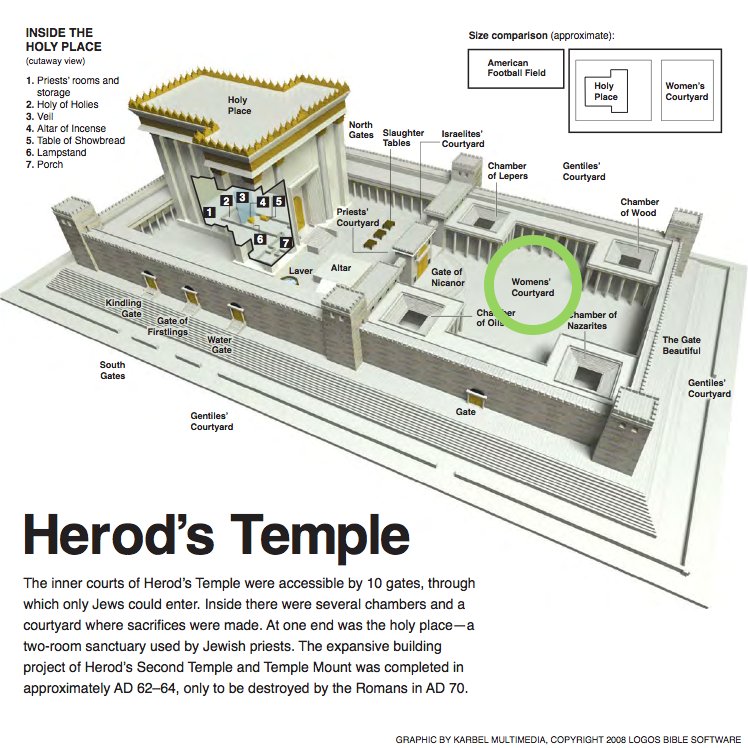
Near the Court of Women was an area with thirteen brass offering boxes for various donations that was called the treasury. The treasury chests were called trumpets because they were like an inverted horn, narrow at the top, and large at the bottom.
As Jesus watched, the poor widow walked by and dropped in 2 leptas, which were the smallest coin in everyday use. It was worth about 1/100th of a denarius. A denarius was a common day’s wage for a job like fruit picking. So both her coins together were worth only a fraction of a penny, but she gave God both of them, when she could have kept one for herself.
Her gift probably made no difference to the income of the Temple during the week of Passover when an estimated 3 million people visited Jerusalem and brought their offerings, but it made her flat broke for it was all that she had. Some of the wealthy people would have been dragging bags so heavy that they would have needed help, and there would have been oohs and ahhs as all the coins crashed into the chests, but what caught the attention of Jesus was this poor widow giving her 2 tiny coins.
3 He said, “Truly I tell you, this poor widow put in more than all of them, 4 for all these put in gifts for God from their abundance, but she, out of her poverty, put in all that she had to live on.”
Jesus was observant, and He watched how the people gave, and why. The rich, fashionable religious world of Jerusalem paraded before Jesus’ eyes. Many of the rich gave to be seen by others, as today you see pictures of donors holding a giant three-foot long check, or standing beside crippled children for a photo op. They gave a portion of what they had in order to receive the glory of men. The poor widow gave all that she had to God, trusting that He would take care of her when she went back home with no money.
Something that we can learn from this is that when people say “I can’t afford to give anything” it simply means that they have more important things in their life. The widow would have had many needs, but giving God a gift came first and foremost to her. In God’s math, the poorest person on earth can out-give the wealthiest, because it is based on a percentage of what is available to them. To some people, giving $5 is the difference between eating or going hungry, while for others, giving five million would make no impact on their life style. In this case, the $5 offering would be more precious to God, than the gift of five million.
5 As some were talking about the temple and how it was decorated with beautiful stones and gifts, he said, 6 “As for these things which you see, the days will come, in which there will not be left here one stone on another that will not be thrown down.”
Mark’s account is more specific and reads: “As he was leaving the temple, one of his disciples said to him, ‘Look, Teacher! What massive stones! What magnificent buildings!’ ” (Mark 13:1). The disciple was not exaggerating. The temple was considered one of the great wonders of the Roman world. It had been under reconstruction for forty-six years (John 2:20) and was nearing completion, which would come in A.D. 63, a mere seven years before it was destroyed.
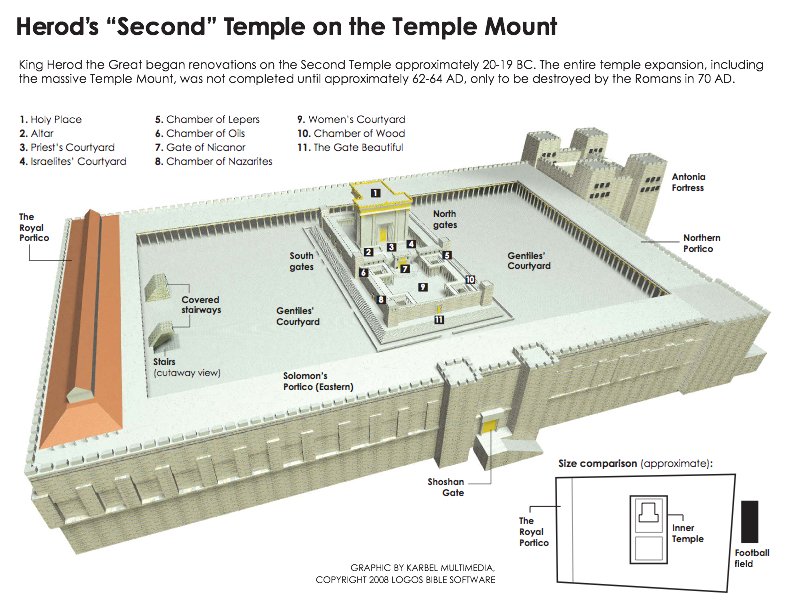
“The exterior of the building wanted nothing that could astound either mind or eye. For, being covered on all sides with massive plates of gold, the sun was no sooner up than it radiated so fiery a flash that persons straining to look at it were compelled to avert their eyes, as from the solar rays. To approaching strangers it appeared from a distance like a snow-clad mountain; for all that was not overlaid with gold was of purest white. From its summit protruded sharp golden spikes to prevent birds from settling upon and polluting the roof. Some of the stones in the building were forty-five cubits in length, five in height and six in breadth.”
The massive foundation stones that the disciple mentioned to Jesus were almost as big as a train’s boxcars. The temple was indeed breathtaking, but Jesus was unimpressed for He saw what was soon coming. Here Jesus begins what is called the “Olivet discourse, or prophecy” and the passages are found in Matthew 24 and 25, Mark 13, and Luke 21. There are some things that we know, and simply some things that we do not. It is a fool that tries to get all of heaven into their head, for it will eventually burst. A wise man gets his head into heaven, so that our thoughts line up with God’s thoughts, then everything will be fine whether we understand it or not. That is what we are going to try and do.
7 They asked him, “Teacher, so when will these things be? What is the sign that these things are about to happen?”
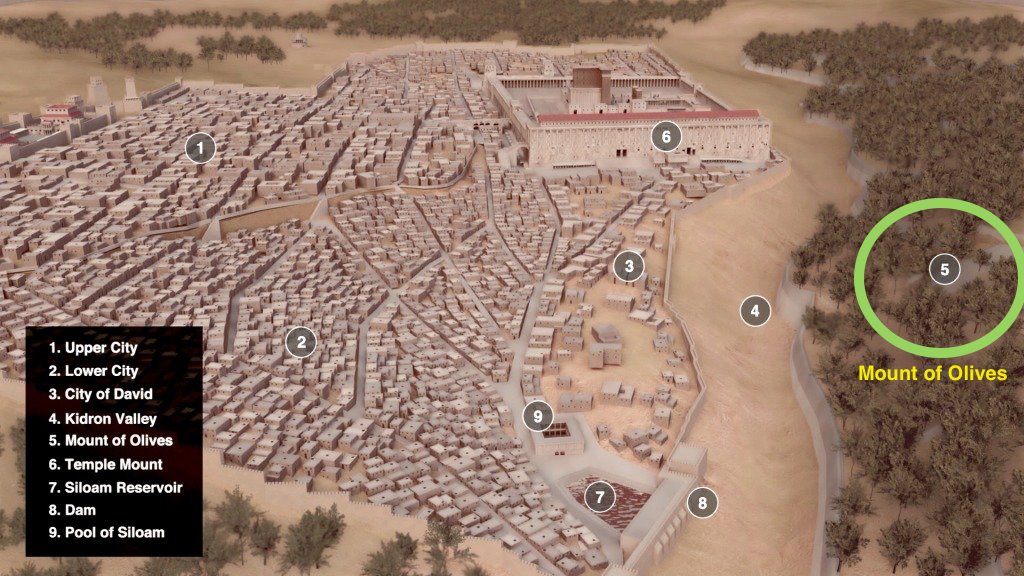
The Mount of Olives is special in scripture. The Shekinah glory of God had departed from the temple 600 years earlier in Ezekiel 11:22–25, and then lifted off from the Mount of Olives. Jesus ascended to heaven near the town of Bethany, which is on the Mount of Olives (Acts 1:12, Luke 24:50–51). Also, the Mount of Olives is where Jesus will return according to Zechariah 14:4 and on that day, it will be split in two. So we can gather, that the Mount of Olives is a special place on the earth, and being that is still one mountain, Jesus has not yet returned.
The disciples asked “What will be the times and the signs that will precede the destruction of the temple?” so that is what they are talking about. Jesus answered their questions, but went much further and discusses His return. Jesus was not interested in setting a certain date on a calendar, but in encouraging his disciples and us, to be steadfast and faithful until he returns.
8 He said, “Watch out that you don’t get led astray, for many will come in my name, saying, ‘I am he,’ and, ‘The time is at hand.’ Therefore don’t follow them.
Jesus said: don’t get led astray, do not be deceived. Many will come in my name, claiming, “I am he,” and “The time is near.” Do not follow them. Every few years someone has figured out the day that Jesus will return, but Mark 13:32 tells us that day and hour no one knows, not even the angels in heaven, nor the Son, but only the Father. So don’t set dates for the return of Jesus, and be wary of anyone that does.
9 When you hear of wars and disturbances, don’t be terrified, for these things must happen first, but the end won’t come immediately.” 10 Then he said to them, “Nation will rise against nation, and kingdom against kingdom.
It is easy to think that the end is getting near when we personally experience such things, but wars, for example, have always been with us. Will Durant wrote: “War is one of the constants of history, and has not diminished with civilization and democracy. In the last 3,421 years of recorded history only 268 of them have seen no war.” During the other 3,153 years, someone was at war. That means that during recorded history, there has been war on the earth for 92% of the time. At least 108 million people were killed in wars during the twentieth century alone.
Many in 1945 thought the end was near during World War II. Some think the end is near because our national debt is out of hand, but this is money-clip eschatology. Their world might be ending, just as many stock brokers jumped from buildings when the Great Depression hit, but that does not mean Jesus is ready to return. Also the word used in “nation against nation” is ethnos, meaning ethnic groups, race against race.
11 There will be great earthquakes, famines, and plagues in various places. There will be terrors and great signs from heaven.
It is tempting to regard natural catastrophes the same way. During the years between Christ’s death and the destruction of the temple, there was a terrible earthquake in Laodicea, a volcano buried Pompeii, and there was a famine in Rome itself. These events did not mean the end of all things. Neither would it mean the end if California fell into the sea. Sadly, with the rise of every war and earthquake there comes an increase of false christs who say they have the answer. The world is filled with violence, because it is filled with sinful people.
12 But before all these things, they will lay their hands on you and will persecute you, delivering you up to synagogues and prisons, bringing you before kings and governors for my name’s sake.
Jesus warned us that His disciples would face religious persecution, ironically, at the hands of the local religious leaders and the synagogues that should have been safe houses for them. The persecution would cause them to be forced to other cities and they would take the gospel with them wherever they went. Persecution was a main driver of spreading the gospel, or the apostles would have just remained in Jerusalem.
13 It will turn out as a testimony for you. 14 Settle it therefore in your hearts not to meditate beforehand how to answer, 15 for I will give you a mouth and wisdom which all your adversaries will not be able to withstand or to contradict.
When they were persecuted, the disciples would dazzle their interrogators with their wisdom. For example, Peter and John before the Sanhedrin (Acts 4:13), Stephen before the Sanhedrin (Acts 6:10; 7:2–54), and Paul before Agrippa (Acts 25:13–26:32). They were amazed at the boldness of Peter and John, knowing that they were only uneducated fishermen.
16 You will be handed over even by parents, brothers, relatives, and friends. They will cause some of you to be put to death. 17 You will be hated by all men for my name’s sake. 18 And not a hair of your head will perish. 19 “By your endurance you will win your lives.
The disciples would also experience personal hatred. The commitment that the gospel demands can even break up families, and it still does. Even today, if you announce that you are a Christian in a Muslim country, or in a hard-line Communist country, the words of Jesus take on reality. Any follower of Christ who follows His example will suffer persecution at some point. This world is not your friend.
Though some of Jesus’ followers would die and be martyred, Jesus told them, “not a hair on your head will perish”. Even if their bodies died, their souls live on with God forever. Jesus said Matthew 10:28: “And do not fear those who kill the body but cannot kill the soul. But rather fear Him who is able to destroy both soul and body in hell.” That is perishing. When in the face of persecution, we are to persevere, to endure, and to stand firm. The Christian life is not a sprint, but a marathon.
20 “But when you see Jerusalem surrounded by armies, then know that its desolation is at hand.
Growing up, I was taught that this was an event coming in the future. I wouldn’t say that I was “taught” anything, more like everyone believed that this was still coming. So everyone waited for Jerusalem to be surrounded by armies, the antichrist to enter a rebuilt temple, and this would be “the abomination of desolation”, a sign of Jesus returning soon.
In reality, history records that all this happened 1,948 years ago in 70 AD when the Romans destroyed Jerusalem, and it is so accurate in every detail that I find it fascinating. Jesus was also a prophet, and He outlined to His disciples what was coming about forty years later.
Mark 13:14 speaks of “the abomination that causes desolation”. This is a quote from Daniel 9:27 and 11:31 that described a coming figure who would desecrate the temple and abolish the daily sacrifices there.
Daniel 11:31 reads: “And forces shall be mustered by him, and they shall defile the sanctuary fortress; then they shall take away the daily sacrifices, and place there the abomination of desolation.” NKJV
This meant an abomination so detestable that it would cause the temple to be abandoned by the people of God and bring its desolation. This had happened 150 years earlier when the Syrian (Seleucid) King Antiochus IV Epiphanes conquered Jerusalem and attempted to Hellenize the people, forbidding them to circumcise their children, to offer Levitical sacrifices, and forcing them to sacrifice swine on the altar. The writer of 1 Maccabees states: “On the fifteenth day of Chislev [possibly December] in the one hundred and forty-fifth year, they erected a desolating sacrilege upon the altar of burnt offering” (1:54). It was a statue of Zeus and probably an image of Antiochus himself.
So the invading king took away the daily sacrifice, defiled the altar and the temple by offering pigs there, and then placed a statue of the Greek god Zeus on the altar instead, so they could worship him. That was the last “desolation” that happened to the temple, and probably what Daniel was speaking of.
In August-September of 66AD, the Roman treasury officer Florus, took 17 talents of gold from the temple treasury in Jerusalem. That was about 1,300 pounds of gold. The Jews became upset and demanded that he return it, but he was merciless and corrupt.
He called the Jews together to hear their complaint, then had his soldiers massacred 3,600 of them. Florus then aggravated the situation further by calling another assembly, and when the Jews began to complain, he ordered another massacre. This time the Jews fought back, and Florus had to flee the city. The Jews expelled all the Roman soldiers from Jerusalem, and the great Jewish revolt began.
21 Then let those who are in Judea flee to the mountains. Let those who are in the middle of her depart. Let those who are in the country not enter therein. 22 For these are days of vengeance, that all things which are written may be fulfilled.
Jesus basically said, forty years from now, when you see Jerusalem surrounded by armies, and the Roman legions begin to encircle the city, a new desolation is about to take place. He warned His disciples to get out of the city before it was completely surrounded.
The historian Josephus records that in September of 66 A.D. during the “Great Jewish Revolt” that the Roman Legate Cestius Gallus led armies made up of 30,000 Roman soldiers supported by 14,000 allies provided by Agrippa II and other rulers. They surrounded Jerusalem just as Jesus had warned, and began to attack the city of Jerusalem. After five days, they successfully penetrated the outer the wall and were close to taking the city. Then suddenly without any reason at all, Cestius called off the siege and withdrew. The Jewish rebels chased them and cut them down as they left. It looked like a great victory for the Jews, and they sang victory songs on the way back to town. They thought that God had delivered them from the Romans.
The fourth-century historian Eusebius records that Christians recognized the warning of Jesus. He wrote: “The people of the church in Jerusalem were commanded by an oracle given by revelation before the war to those in the city…to depart and dwell in one of the cities of Perea which they called Pella.”
The church at Jerusalem heard from the Holy Spirit, and they remembered the words of Jesus: “When you see Jerusalem surrounded by armies.” All the Christians fled the city, crossed the Jordon River and stayed in a town called Pella where there were many Christian churches. Josephus notes that “Many of the distinguished Jews abandoned the city like swimmers from a sinking ship." Even though that battle had looked like a great victory for the Jews, the Christians knew the words of Jesus and they fled from the city of Jerusalem.
When the Romans returned with a much greater force, there was not a Christian left in the city. Then they began one of the cruelest sieges in history. Unfortunately, the siege started a few days before the Passover celebration and Jews from many surrounding countries were in the city for the festival when it began. The city was bustling, full, and crowded with people, when the Roman army suddenly showed up and surrounded it.
In April of 70 AD the Roman General Titus arrived with the 3rd, 15th and the 18th Roman Legions. The 5th Legion arrived from Emmaus and set up camp on the north side of the city, on Mount Scopus. Later the next day, the famed 10th Roman Legion, which was founded by Julius Caesar, marched in from Jericho and camped on the Mount of Olives, east of the city. Suddenly there were around 70,000 Roman soldiers encircling around Jerusalem.
In Luke 19:43 Jesus had wept over Jerusalem and said: “For days will come upon you when your enemies will build an embankment around you, surround you and close you in on every side, and level you, and your children within you, to the ground; and they will not leave in you one stone upon another, because you did not know the time of your visitation.”
In June, the Romans dug a giant trench five miles long and created a huge embankment of earth that completely surrounded the city, with over a dozen forts along its length, just as Jesus had said. The hundreds of thousands of Jews that had come to Jerusalem for the Passover feast were trapped inside, and they began to starve.
23 Woe to those who are pregnant and to those who nurse infants in those days! For there will be great distress in the land, and wrath to this people. 24 They will fall by the edge of the sword, and will be led captive into all the nations. Jerusalem will be trampled down by the Gentiles, until the times of the Gentiles are fulfilled.
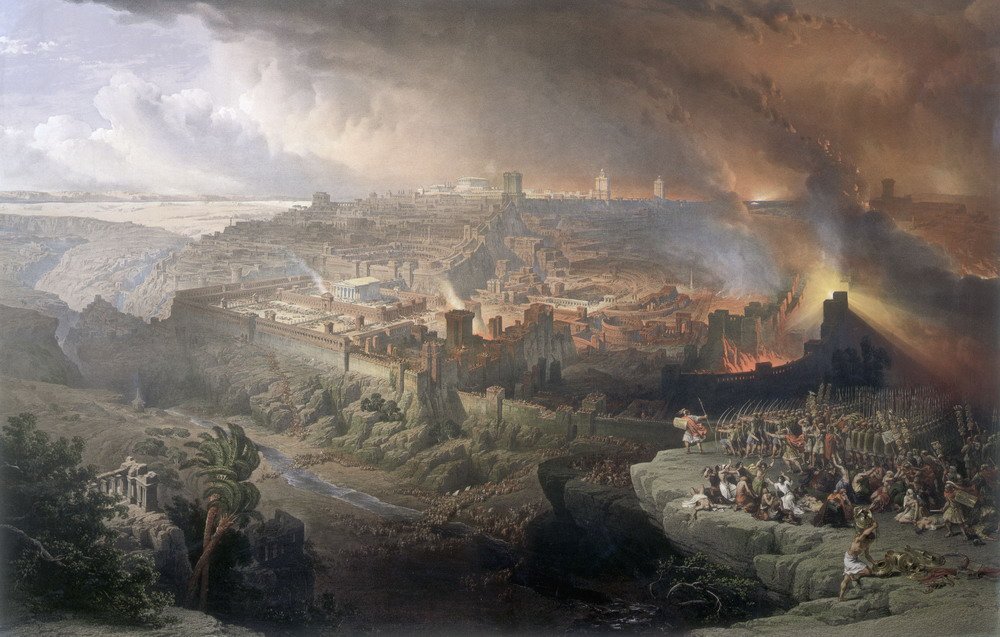
The Romans crucified captured Jews in full view of those on the wall to instill fear in those that were still in the city and to encourage them to surrender. The city starved in hunger, and women roasted and ate their own children. People killed, raped, and fought each other for supplies. Jerusalem could not bury all the bodies, so they were flung over the wall. The skies were black with smoke from the fires. Mini civil wars raged inside the city among the various factions, until the Romans started breaching the walls, which caused them to unite against a greater enemy.
By the end of the siege, over 1,100,000 Jews were killed, and about one hundred thousand captured and deported. Thousands were forced to become gladiators and died in the arena. Many others were forced into labor for building projects, while those under 17 years of age were sold into servitude. They were carried off to other lands, as Jesus had said.
Titus and his soldiers celebrated their victory by parading the golden candlesticks and the “Table of the Bread of God's Presence” through the streets of Rome. Until then, these items had only ever been seen by the high priest of the Temple.
The events of 70 A.D. marked the extinction of Jewish national existence, the end of the sacrifices and temple rituals, and the dispersion of the Jewish people among all the nations. It is an immense event in interpreting scripture and well recorded in history. Legend has it that the gold that decorated the temple melted and ran down into the cracks between the stone and into the very foundation of the temple. So the Romans meticulously disassembled the temple stone by stone to get at the melted gold. Rome then used the gold, treasures and marble taken from the temple to build their Colosseum. The words of Jesus were absolutely true, fulfilled to the letter, and every stone was taken down.
Here is an interesting note about the abomination of desolation. A Roman Legion was an army unit that consisted of about 5,000 men, and each legion carried their own silver eagle on a staff.
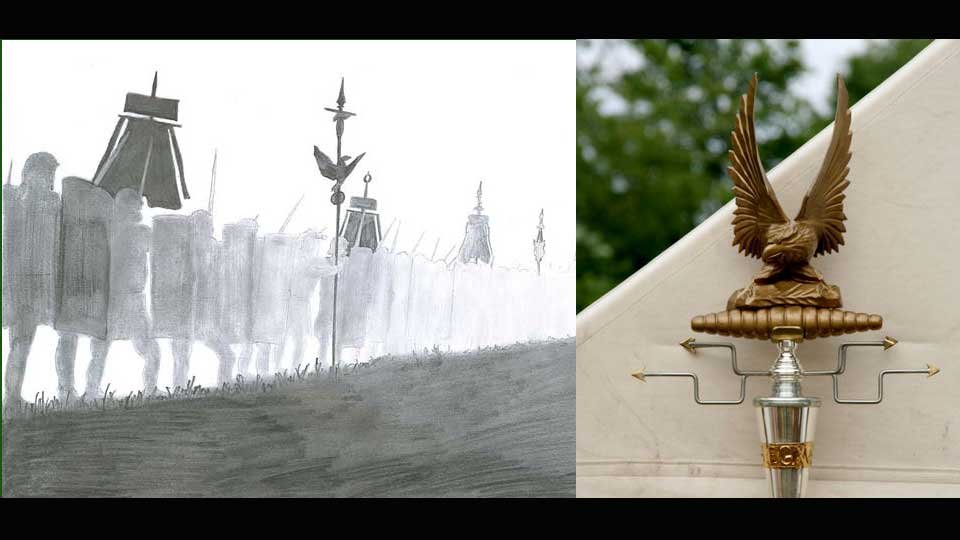
70,000 Roman troops were there when Jerusalem was taken. With one eagle for each legion, this would have been 14 idols they carried into temple in victory. The historian Josephus records that the Romans put their eagles over the eastern gate of the temple and then offered sacrifices to them. This was possibly the abomination spoken of by Jesus, though I am not sure on that. It is said that General Titus entered the Holy of Holies, and found no one there. What we do know is that the Romans made sacrifices to their idols on the temple mound, the destruction of Jerusalem ended the age of the Jewish nation, and marked the beginning of the age of the Gentiles. As far as I know, the age of the Gentiles will end when Jesus Christ returns to earth.
25 There will be signs in the sun, moon, and stars; and on the earth anxiety of nations, in perplexity for the roaring of the sea and the waves; 26 men fainting for fear, and for expectation of the things which are coming on the world: for the powers of the heavens will be shaken. 27 Then they will see the Son of Man coming in a cloud with power and great glory. 28 But when these things begin to happen, look up and lift up your heads, because your redemption is near.”
Jesus combined several Old Testament prophecies from Joel (2:30), Isaiah (13:10), Ezekiel (32:7), and Haggai (2:6) into one paragraph here. Before He returns, the earth will be filled with unnatural disasters, earthquakes, tidal waves, and signs in the sun, moon, and stars. In the middle of this chaos, Jesus will suddenly come in shining clouds of glory. There is nothing that we can do about what is coming on the Earth, and none of what is coming should matter to us, or make us afraid. Basically, if knowing an earthquake is coming tomorrow would make a difference in how you live today, then we already have a problem.
29 He told them a parable. “See the fig tree and all the trees. 30 When they are already budding, you see it and know by your own selves that the summer is already near. 31 Even so you also, when you see these things happening, know that God’s Kingdom is near. 32 Most certainly I tell you, this generation will not pass away until all things are accomplished. 33 Heaven and earth will pass away, but my words will by no means pass away.
Jesus tells a parable about a fig tree “and all the trees” when they are beginning to sprout leaves, we know that summer is coming. He does not seem to be referring to Israel specifically as He said “all the trees” as well. There will be a future time of trouble and disasters. The generation that sees all these unnatural disasters come on the Earth, will also live to see His return. As long as we stay close to Jesus, we do not have to worry about what is coming. Those that were in Jerusalem that heeded the words of Jesus, missed the destruction that came. His word protected them, while they were on earth.
We must understand that every word spoken by Jesus about the destruction of Jerusalem came true: that it would be surrounded by armies, that they must flee the siege, that they would otherwise be deported, that a trench would be built around it, that Jerusalem would be trampled by the Gentiles, and that one stone would not be left on another. Just as surely as all of this took place, so is His return. Every word that Jesus spoke will be fulfilled, though it may happen differently than we understand it.
34 “So be careful, or your hearts will be loaded down with carousing, drunkenness, and cares of this life, and that day will come on you suddenly. 35 For it will come like a snare on all those who dwell on the surface of all the earth. 36 Therefore be watchful all the time, praying that you may be counted worthy to escape all these things that will happen, and to stand before the Son of Man.”
We are to remain vigilant and watchful, knowing that Jesus Christ is going to return. Just to clarify, this is what I understand about His return:
Jesus is coming back as suddenly as a lightning bolt flashing across the sky, and as unexpectedly as a thief in the night. There will be no time to go and pray, or even say “God have mercy on me” for the time of mercy will have passed, and the time of judgement will have began. When Jesus returns, there will be two types of people on the earth: the saved, and the damned.
There is no middle ground. There is no silent snatching away in secret, for Jesus is coming to rule and reign. There will only be His “second coming” which occurs at the “last” trumpet, not a third or a fourth. There will be no one “left behind” when Jesus returns and no “seven years of great tribulation” to repent and accept Jesus as you see in the movies. As I see it, that is deception, and an end-time delusion.
The clock will be ticking just as it did every day while Noah was building the ark: 11:57, 58, 59 and bam! You will be standing before the Lord Jesus Christ and giving an account of your life here on earth. Ready or not, here He is. He will know you, or He will not.
Those who have accepted Jesus as Lord will be given rewards for their actions while He was away, and what they have done with the talents. Those who have not, will face the Great White Throne Judgement, and eventually burn in a place called hell. I could go into more details, but I have already been speaking for an hour. If you want to hear more, check out my series on “What Time Is It?”
37 Every day Jesus was teaching in the temple, and every night he would go out and spend the night on the mountain that is called Olivet. 38 All the people came early in the morning to him in the temple to hear him.
According to Mark 11:11, Jesus probably stayed the nights in Bethany, a small village near Jerusalem, on the opposite side of the Mount of Olives. If you became convicted over any of that, making things right with Jesus is easy. This is the Sinners Prayer as written by Billy Graham. Pray it sincerely:
Dear Lord Jesus, I know that I am a sinner, and I ask for Your forgiveness. I believe You died for my sins and rose from the dead. I turn from my sins and invite You to come into my heart and life. I want to trust and follow You as my Lord and Savior. In Your Name.
This concludes today’s chapter of our ongoing Bible Study. Thank you for participating and being a part of Refreshing Hope! To complete this study, we invite you to test your knowledge with the accompanying quiz!

